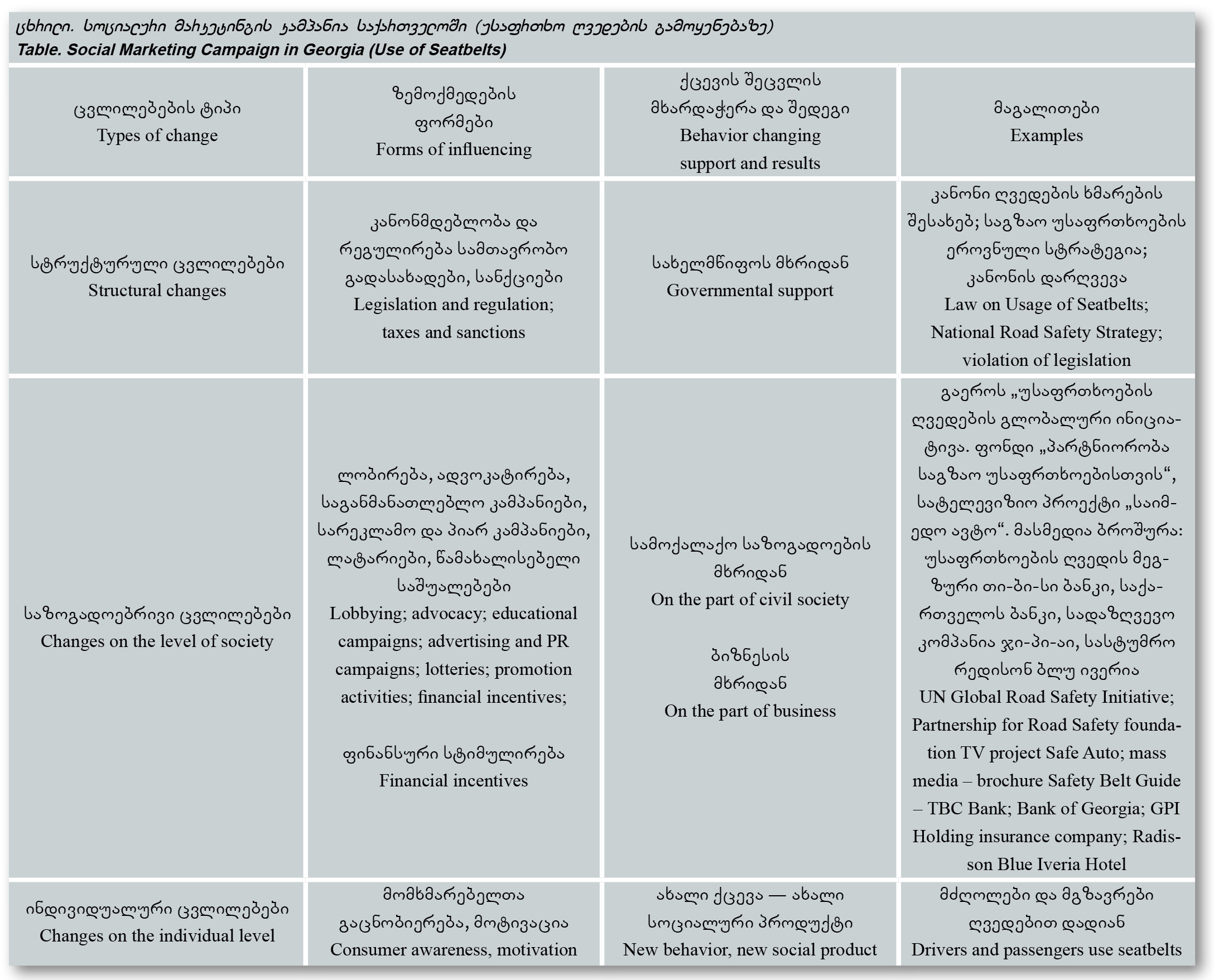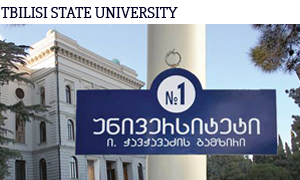
FACULTY OF ECONOMICS AND BUSINESS
Challenges of Social Marketing in Georgia
The social marketing concept emerged in the 1970s and has developed over the decades into a popular subject in marketing. It is even called the “21st century’s philosophy of business management”. The key goal of social marketing is to focus on the solution of problems to social, ecological and public welfare issues, none of which were included in the “classic” goals of marketing. The concept envisages powerful social mechanisms to ensure the unity of interests of business and the public requirements for achieving consumer welfare. The concept has grown in Georgia over the last two years.
Although the key goal of previous marketing strategies was mainly to increase a company’s profitability, today a major emphasis is placed on the formation and maintenance of sustainable, partnership relations with consumers. The Marketing Department of the Faculty of Economics and Business has been involved in research on social marketing for many years. Since social marketing interventions have been carried out in Georgia to address specific social problems, it is possible to draw specific and important conclusions.
Professors Nugzar Todua and Charita Jashi of the TSU Marketing Department spoke at the World Social Marketing Conference held in Toronto in April 2013. Over 500 marketing researchers and practitioners from 45 countries participated, and the key slogan of the conference was “Changes for the Better”, or how to gain more social benefits through promoting business development. The two Georgian researchers presented a paper “Changing behavior through social marketing –a Georgian case study” which was an analysis of the Georgian experience in the introduction of automobile seatbelts, the process of behavior change, and new forms of support for behavior change.

From a social campaign
It is well known that road safety is an important problem throughout the world, including in Georgia. The use of seatbelts for both drivers and passengers is considered an important component to resolve the problem. However in Georgia the level of public awareness was low. Therefore, a behavior change campaign on using seatbelts was instigated - first through public information on road accident statistics communicated to the public showing the tragic consequences of neglecting seatbelts. According to the Ministry of Internal Affairs (MIA), 1233 road accidents were registered in Georgia between December 1, 2009 and March 1, 2010; 176 persons died and 1744 were injured by those accidents. The MIA pointed out that the mortality rate would have been much lower if passengers had used their belts.
The United Nations subsequently carried out a project called the Global Road Safety Initiative, while the Partnership for Road Safety Foundation implemented a special program to advertise the use of seatbelts. Momentum built so that the problem was discussed at the legislative level, which resulted in the adoption of a law in 2010. A national road safety strategy was developed that yielded results, and was confirmed by monitoring that was carried out several times with the support of international organizations.

Despite these measures, no scientific survey of consumer attitudes towards the existing problems had been conducted until the one carried out by Tbilisi State University in 2012, after the use of seatbelts had been obligatory for almost two years. The goal of the study was to highlight the role of social marketing in Georgian society, specifically for a road safety campaign. Given the goals of the study, a quantitative method was used to carry out interviews for primary data collection. A questionnaire was created to identify the level of awareness of the population for road safety regulation legislation; which particular social groups were using seatbelts; and why joint purpose actions carried out by the state, private businesses and civil society are important.
Research was developed using sampling and respondents were selected according to statistical methodology; 200 drivers and 500 consumers were interviewed in Tbilisi, where most registered drivers are. Within the interviews most respondents expressed a positive attitude towards the new legislation on seatbelts. The survey showed that 70% of respondents supported the introduction of seatbelts; 30% considered it not necessary to use seatbelts at low speeds, however.
The information campaign carried out by civil society on raising public awareness, as well as educational and cultural events supported by private businesses with the same safety themes, were seen as positive. Georgian consumers believe it is extremely important enforce the law and to introduce road safety courses at schools. The survey showed that the campaign contributed greatly to change behavior (see table).
Social media (mostly Facebook, the most popular social network in Georgia) was actively used to publicize the introduction of seatbelts. The survey focused on the role of social media in business development which is the major aspect of social marketing. A main role of a social network is its interactive nature that enables a consumer to get in contact with a desirable company, ask questions and receive answers. This is efficient for the company too, because it gets acquainted with consumer opinions about products and can act on them more quickly. The survey confirmed that social networks contributed largely to popularize safety belts, to encourage using them and to achieve successful results with at low cost (sometimes even at no cost). Georgian consumers’ decisions, it was shown, are frequently influenced by social networks.
The survey confirmed that 20.5% of respondents have consumed products or services offered through social networks; 4% have also become consumers, but are dissatisfied; 59% are not familiar with any such social network services, while 16.5% believe they might become consumers in the future. This means that social networks already exert influence on one fifth of Georgian consumers when making decisions to buy something. The survey also ascertained that social media proved effective in case of introducing seatbelts.
During the World Social Marketing Conference attention was focused on Georgian business development challenges and perspectives as well as behavior changing in crisis situations. Several links between the global economic crisis and the internal motivations of Georgian consumers were ascertained through on the marketing survey. In particular it revealed what part of the population suffered most from the economic crisis; how the crisis influenced them; how much they were interested in information about the crisis; where they obtained information; how much their attitudes changed towards a product; which method of saving is used by Georgian consumers when buying certain products; on which products they do not save money; and what are their motives when buying expensive brands. All these are directly linked with social marketing research, as crisis situations have an influence on consumer behavior and decisions, including the use of seatbelts.
The survey confirmed the following: The more the company’s products help settle social problems, the more this company finds it easier to establish and maintain favorable and long-term relations with a consumer. This concerns ecological risk as well as security or health prevention problems, which have reached alarming proportions in this country.
The success of a social marketing program depends on many factors, but as the survey showed, the following are the most important when initiating a campaign:
- The social problem should be clear and important for Georgian consumers;
- Consolidation of the state, business and civil society is essential for resolving the social problem and initiating a relevant marketing program;
- Selection of the right partner (including non-commercial organizations) is crucial for the implementation of a social marketing program;
- To settle particular social problems it is essential to select target groups in order to stimulate consumers to accept social ideas, and to develop and implement a campaign for social changes.
The participation of the Georgian researchers in a world conference was important, as they joined the International Social Marketing Association, which will provide opportunities to realize academic and scientific activities at the international level.
Recently, the well-known publisher Pearson allowed Tbilisi State University to translate into Georgian and publish a book by American Professors Philip Kotler and Kevin Lane Keller entitled “Marketing Management” (14th edition). This book is designed for MA students in business administration and will also provide information for business people as well as researchers interested in marketing issues.





